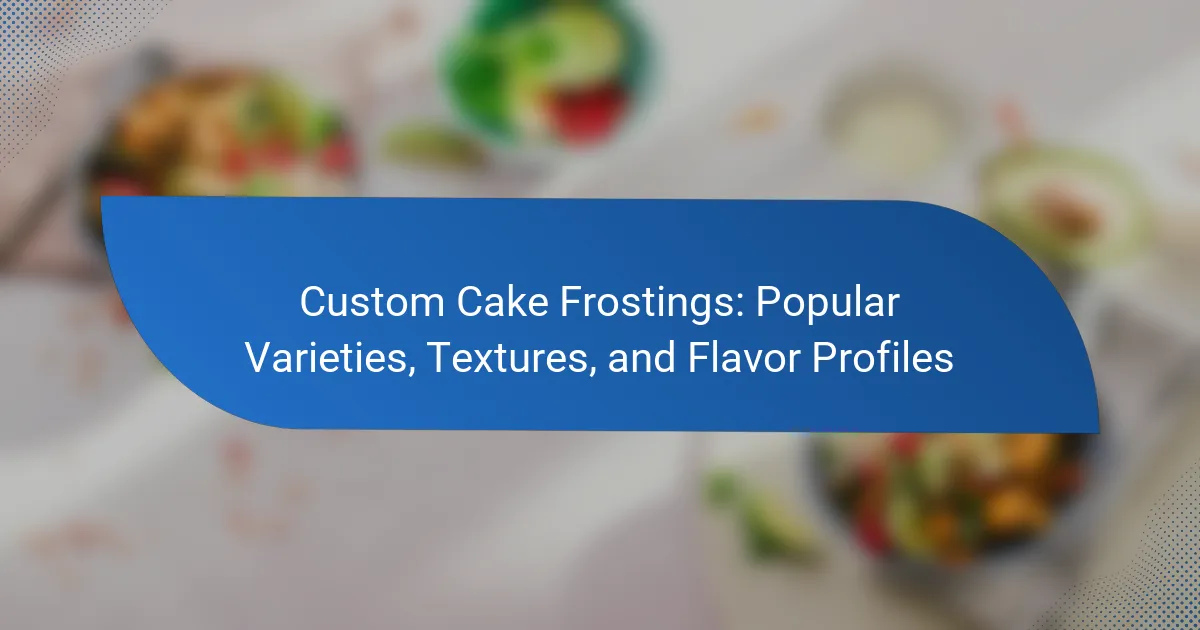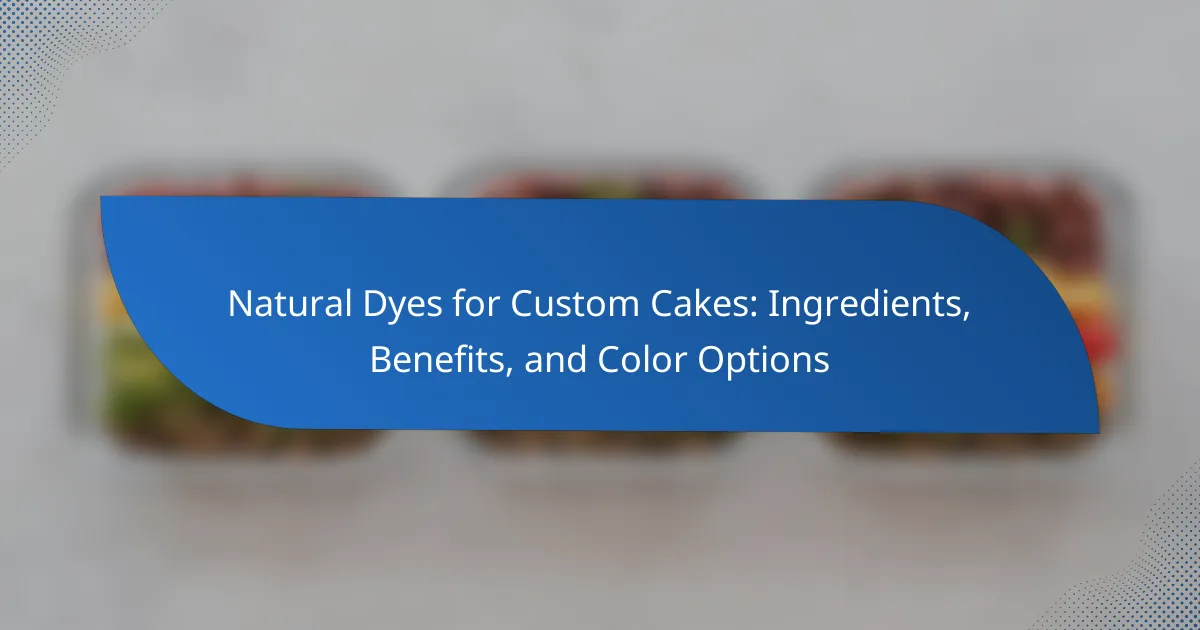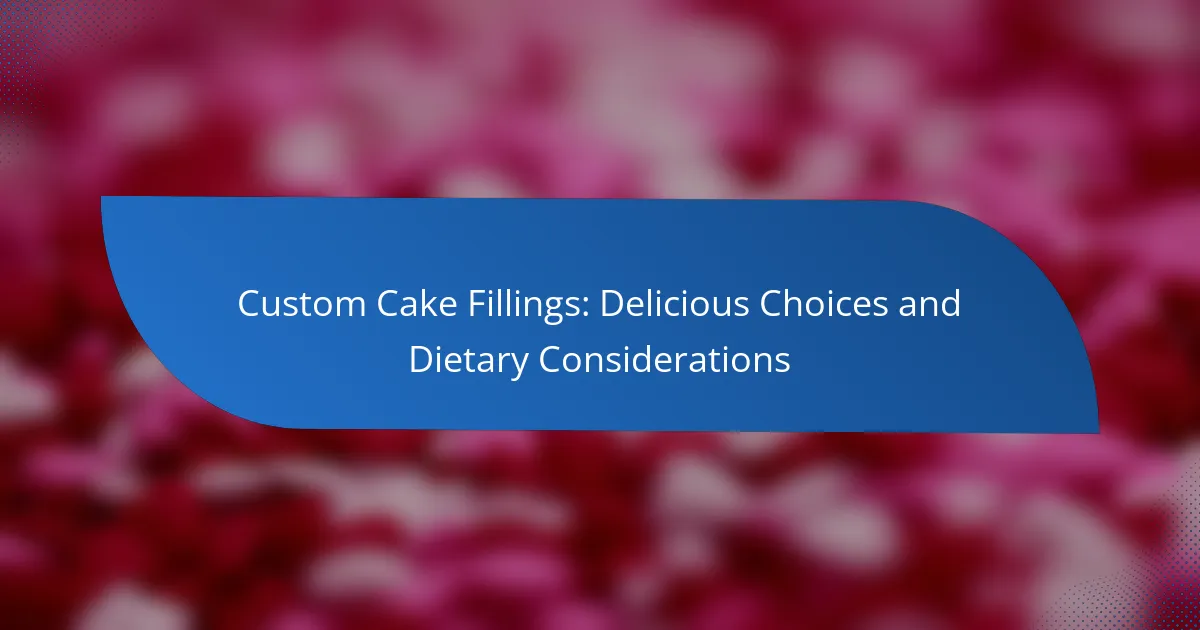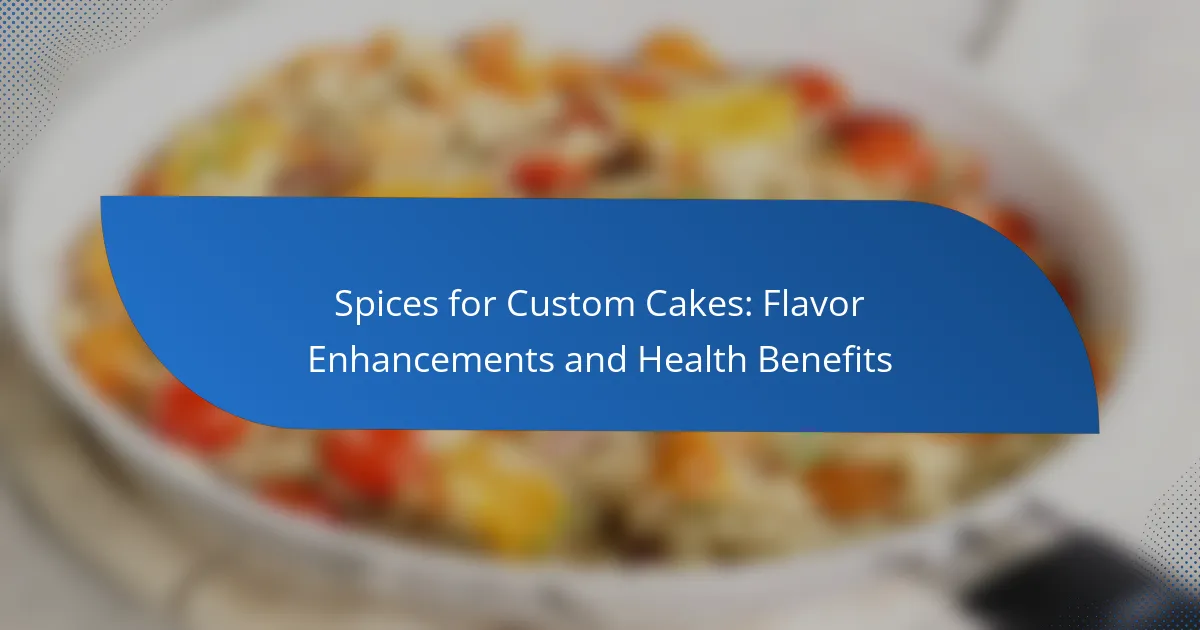Vegan custom cake ingredients are plant-based alternatives that replace traditional baking components, including flour, sugar, baking powder, and binders like flaxseed meal or applesauce. Non-dairy milk and vegan butter or coconut oil serve as substitutes for their dairy counterparts, ensuring cakes remain moist and flavorful without animal products. These ingredients not only promote heart health by being cholesterol-free but also cater to dietary restrictions, making them suitable for individuals with lactose intolerance or egg allergies. Additionally, flavor enhancements such as natural extracts, spices, cocoa powder, and fruit purees enrich the taste and texture of vegan cakes. Overall, vegan custom cake ingredients provide a healthier, inclusive, and environmentally friendly option for cake lovers.
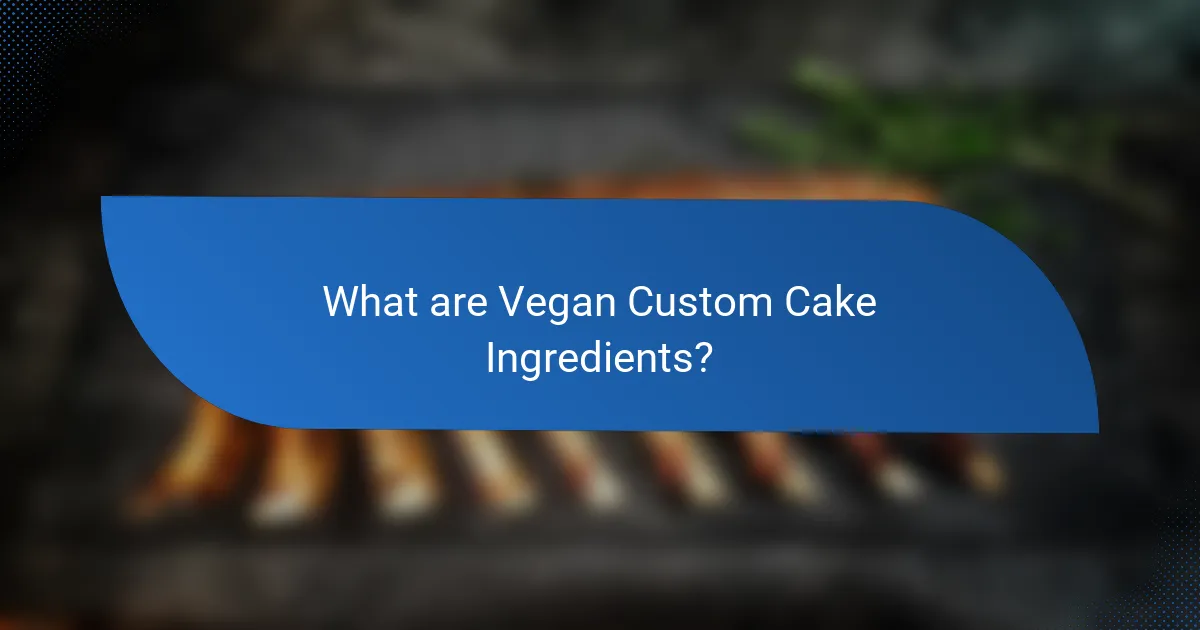
What are Vegan Custom Cake Ingredients?
Vegan custom cake ingredients are plant-based alternatives used in cake recipes. Common ingredients include flour, sugar, and baking powder. Instead of eggs, ingredients like flaxseed meal or applesauce serve as binders. Non-dairy milk such as almond or soy milk replaces regular milk. Vegan butter or coconut oil is often used in place of traditional butter. For flavor, natural extracts like vanilla or almond are common. These ingredients ensure the cake remains moist and flavorful without animal products.
How do Vegan Custom Cake Ingredients differ from traditional cake ingredients?
Vegan custom cake ingredients differ from traditional cake ingredients primarily by excluding animal products. Traditional cakes typically use eggs and dairy, which provide structure and moisture. Vegan cakes substitute these with plant-based alternatives. Common substitutes include flaxseed meal or chia seeds for eggs, and almond milk or coconut milk for dairy. These ingredients can alter the texture and flavor profile of the cake. For example, flaxseed meal adds a nutty taste, while almond milk can enhance sweetness. Additionally, vegan cakes often use ingredients like applesauce or bananas for moisture. These substitutions can lead to cakes that are lower in cholesterol and saturated fat.
What are the key components of vegan cake ingredients?
The key components of vegan cake ingredients include plant-based flour, sweeteners, and leavening agents. Plant-based flour, such as almond or whole wheat flour, provides structure. Vegan sweeteners, like maple syrup or coconut sugar, add sweetness without animal products. Leavening agents, such as baking soda or vinegar, help the cake rise. Additionally, plant-based fats like coconut oil or applesauce replace traditional butter. Non-dairy milk, such as almond or soy milk, serves as a liquid base. Finally, flavorings like vanilla extract or cocoa powder enhance taste. These ingredients work together to create a delicious vegan cake.
How does the absence of animal products affect cake texture and flavor?
The absence of animal products affects cake texture and flavor by altering moisture content and fat composition. Without eggs, cakes may become denser and less aerated. Egg proteins contribute to structure; their absence can lead to a crumbly texture. Replacing eggs with plant-based alternatives like flaxseed or aquafaba can improve moisture retention. Dairy-free options can also affect richness; coconut milk or nut milk can provide creaminess. Flavor profiles may shift, as animal products often add richness and depth. However, using ingredients like vanilla extract or cocoa can enhance flavor in vegan cakes. Studies show that vegan cakes can achieve desirable textures and flavors with proper substitutions.
Why are substitutions necessary in vegan baking?
Substitutions are necessary in vegan baking to replace animal-derived ingredients. Traditional baking often relies on eggs, dairy, and honey. Vegan baking eliminates these ingredients, requiring alternatives for structure, moisture, and sweetness. For instance, applesauce can replace eggs for binding. Plant-based milks serve as dairy substitutes, providing liquid and flavor. Maple syrup or agave can replace honey for sweetness. These substitutions ensure the final product maintains texture and taste. Research shows that using appropriate substitutes can yield comparable results in flavor and consistency.
What common non-vegan ingredients require substitutions?
Common non-vegan ingredients that require substitutions include eggs, dairy milk, butter, and gelatin. Eggs can be replaced with flaxseed meal or applesauce. Dairy milk can be substituted with almond milk or soy milk. Butter is often replaced with coconut oil or vegan margarine. Gelatin can be substituted with agar-agar or pectin. These substitutions maintain the texture and moisture in baked goods while adhering to vegan standards.
How do substitutions impact the baking process?
Substitutions impact the baking process by altering the chemical reactions that occur during baking. Different ingredients can change moisture levels, texture, and flavor. For instance, replacing eggs with flaxseed meal can result in a denser cake due to the lack of aeration. Similarly, using almond milk instead of dairy milk affects the fat content, leading to a different crumb structure. Substitutions may also require adjustments in baking time and temperature. For example, using coconut oil instead of butter can result in a quicker melting point, potentially affecting the final product. Each ingredient substitution can lead to unique outcomes, making experimentation essential for desired results.
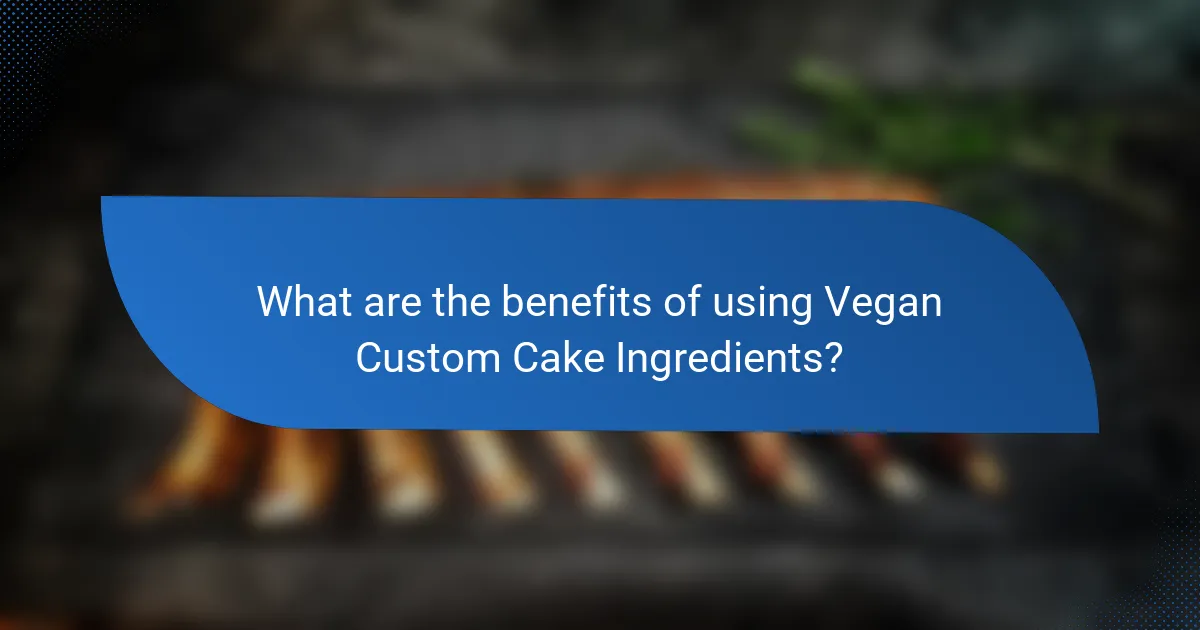
What are the benefits of using Vegan Custom Cake Ingredients?
Vegan custom cake ingredients offer numerous benefits. They are often healthier than traditional cake ingredients. Vegan ingredients typically contain no cholesterol. This can lead to better heart health. Many vegan ingredients are also lower in saturated fats. This can contribute to weight management. Additionally, vegan custom cakes often cater to dietary restrictions. They are suitable for those with lactose intolerance or egg allergies. Vegan options can also be more environmentally friendly. Plant-based ingredients generally have a lower carbon footprint. This aligns with sustainable eating practices. Overall, vegan custom cake ingredients provide health benefits, dietary inclusivity, and eco-friendliness.
How do Vegan Custom Cake Ingredients contribute to health?
Vegan custom cake ingredients contribute to health by offering nutrient-rich alternatives to traditional baking components. They often include whole grains, fruits, and plant-based proteins. Whole grains provide essential fiber, which aids digestion and promotes heart health. Fruits add vitamins, minerals, and antioxidants that support overall wellness. Plant-based proteins, such as nuts and legumes, help in muscle repair and growth. Additionally, vegan ingredients typically contain lower saturated fats compared to dairy and eggs. This can lead to better cholesterol levels and reduced risk of heart disease. Research indicates that diets high in plant-based foods are linked to lower rates of chronic illnesses. Thus, using vegan ingredients in custom cakes can enhance health benefits while still satisfying sweet cravings.
What nutritional advantages do vegan ingredients provide?
Vegan ingredients provide numerous nutritional advantages. They are often lower in saturated fats compared to animal products. This can lead to improved heart health and lower cholesterol levels. Vegan ingredients are typically rich in dietary fiber, which aids digestion and helps maintain a healthy weight. They also contain a variety of vitamins and minerals, such as vitamin C, potassium, and magnesium. Many vegan ingredients are high in antioxidants, which can reduce inflammation and lower the risk of chronic diseases. Additionally, plant-based proteins can support muscle health and recovery. Research shows that diets rich in plant foods are associated with a lower risk of developing conditions like diabetes and hypertension.
How can vegan cakes cater to dietary restrictions?
Vegan cakes can cater to dietary restrictions by using plant-based ingredients that avoid common allergens. They often substitute eggs with flaxseed or applesauce, which are suitable for those with egg allergies. Dairy is replaced with almond milk, coconut milk, or soy milk, catering to lactose intolerance. Gluten-free options are available by using almond flour or coconut flour for those with gluten sensitivities. Additionally, vegan cakes can be made without refined sugars, using alternatives like maple syrup or agave nectar for those managing sugar intake. These substitutions allow for a wide range of dietary needs to be met while still providing delicious cake options.
What environmental benefits are associated with vegan baking?
Vegan baking offers significant environmental benefits. It reduces greenhouse gas emissions compared to traditional baking. Animal agriculture is a major contributor to climate change. Studies show that plant-based diets can lower carbon footprints by up to 50%. Vegan baking also conserves water resources. Producing plant-based ingredients typically requires less water than animal products. For example, producing one pound of almonds uses approximately 1,900 gallons of water, while beef production requires about 1,800 gallons for one pound. Additionally, vegan baking promotes biodiversity. It encourages the use of a wider variety of crops. This can help reduce monoculture farming practices that harm ecosystems. Overall, vegan baking supports a more sustainable food system.
How does vegan baking reduce carbon footprint?
Vegan baking reduces carbon footprint by eliminating animal products, which are resource-intensive to produce. Animal agriculture is responsible for a significant percentage of greenhouse gas emissions. For example, livestock production generates about 14.5% of global emissions according to the Food and Agriculture Organization. Plant-based ingredients require less land, water, and energy compared to animal-derived ingredients. This shift lowers overall resource consumption and emissions associated with food production. Additionally, using local and seasonal plant-based ingredients further minimizes transportation emissions. Thus, vegan baking contributes to a more sustainable food system.
What role does plant-based baking play in sustainability?
Plant-based baking significantly contributes to sustainability by reducing environmental impact. It minimizes reliance on animal products, which are resource-intensive to produce. For instance, livestock farming accounts for approximately 14.5% of global greenhouse gas emissions. Additionally, plant-based ingredients often require less water and land compared to animal-based alternatives. For example, producing a pound of wheat requires about 1,800 gallons of water, while a pound of beef requires around 1,800 gallons. Furthermore, plant-based baking promotes biodiversity by encouraging the use of a variety of crops. This shift can lead to improved soil health and reduced chemical use in agriculture. Overall, plant-based baking supports a more sustainable food system.
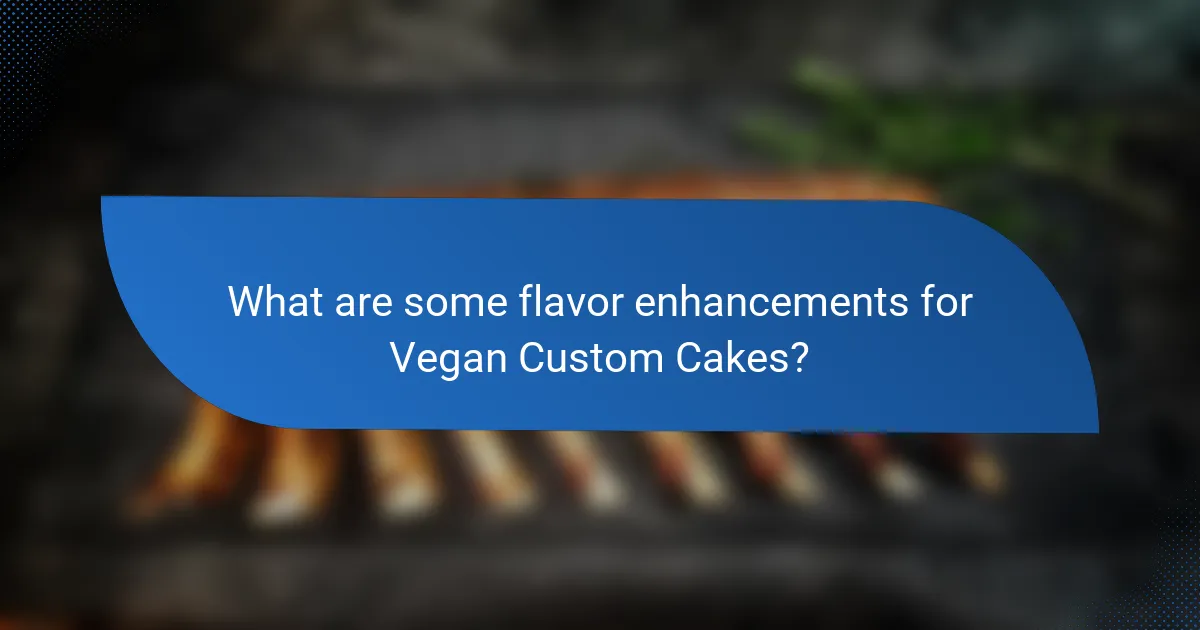
What are some flavor enhancements for Vegan Custom Cakes?
Flavor enhancements for vegan custom cakes include various natural ingredients. These enhancements can elevate taste and aroma. Common options are vanilla extract, almond extract, and citrus zest. Each of these adds depth to the flavor profile. Spices like cinnamon, nutmeg, and cardamom also contribute unique tastes. Cocoa powder or melted dark chocolate can enrich chocolate cakes. Fruit purees, such as apple or banana, enhance moisture and sweetness. Additionally, using plant-based yogurt can add tanginess and creaminess. These enhancements are widely recognized in vegan baking for their effectiveness.
How can flavors be enhanced in vegan cakes?
Flavors in vegan cakes can be enhanced by using natural extracts and spices. Ingredients like vanilla extract, almond extract, and citrus zest add depth. Spices such as cinnamon, nutmeg, and cardamom provide warmth and complexity. Incorporating pureed fruits like bananas or applesauce can also intensify sweetness and flavor. Additionally, using high-quality cocoa powder or dark chocolate enhances richness. Dairy-free yogurt or plant-based sour cream can add moisture and tanginess. Flavor can also be boosted by adding a pinch of salt, which enhances overall taste perception. These techniques are supported by culinary practices that emphasize flavor layering for optimal results.
What natural flavorings are best for vegan cakes?
Vanilla extract, almond extract, and citrus zest are the best natural flavorings for vegan cakes. Vanilla extract adds a classic sweetness and depth. Almond extract provides a rich, nutty flavor that enhances various cake types. Citrus zest, like lemon or orange, offers a fresh and vibrant taste. These flavorings are derived from natural sources, making them suitable for vegan recipes. They can significantly enhance the overall flavor profile of vegan cakes. Using high-quality extracts and fresh zest ensures the best results in baking.
How do spices and extracts influence vegan cake taste?
Spices and extracts significantly enhance the taste of vegan cakes. They add depth and complexity to flavors. Common spices like cinnamon and nutmeg provide warmth and sweetness. Extracts such as vanilla and almond contribute rich aromatic notes. These flavorings can compensate for the absence of eggs and dairy. Their concentrated nature means only small amounts are needed for a big impact. Research shows that spices can also improve the perceived sweetness of baked goods. This allows for reduced sugar usage without sacrificing flavor. Overall, spices and extracts are essential for creating delicious vegan cakes.
What techniques can improve the overall flavor profile of vegan cakes?
Incorporating flavorful ingredients enhances the overall flavor profile of vegan cakes. Use high-quality vanilla extract to add depth. Citrus zest, such as lemon or orange, brightens flavors. Adding spices like cinnamon or nutmeg can create warmth and complexity. Using plant-based yogurt or applesauce adds moisture and enhances taste. Incorporating nut butters introduces richness and nuttiness. Experimenting with various plant milks can offer different flavor notes. Lastly, using natural sweeteners like maple syrup or agave can provide unique sweetness profiles. These techniques collectively elevate the taste experience of vegan cakes.
How can layering flavors enhance the cake experience?
Layering flavors can significantly enhance the cake experience by creating a more complex taste profile. This method allows for the combination of different flavors in each bite. For instance, a chocolate cake with layers of raspberry and vanilla frosting offers a balance of sweetness and tartness. Each layer can introduce unique textures and flavors, making the cake more enjoyable.
According to a study published in the “Journal of Food Science,” flavor layering can improve overall flavor perception. The study indicates that diverse flavors can stimulate different taste receptors, leading to a more satisfying eating experience. Thus, layering flavors not only enriches the cake but also engages the palate in a delightful way.
What role does texture play in flavor perception?
Texture significantly influences flavor perception. It affects how the brain interprets taste signals. Different textures can enhance or diminish the overall flavor experience. For example, creamy textures often amplify sweetness. Conversely, gritty textures may lead to a perception of bitterness. Research shows that texture can alter the release of flavor compounds. A study published in the journal “Food Quality and Preference” found that participants rated flavors differently based on texture variations. This indicates that texture is a critical component of flavor perception.
What are some practical tips for creating delicious vegan custom cakes?
Use ripe bananas or applesauce as egg substitutes for moisture. Incorporate non-dairy milk to enhance flavor and texture. Choose a combination of gluten-free flour and almond flour for a unique base. Add natural sweeteners like maple syrup or agave nectar for richness. Utilize aquafaba to create fluffy textures in cakes. Experiment with different plant-based butters for varied flavors. Include spices like cinnamon or vanilla extract for depth. Finally, ensure proper baking time and temperature for optimal results.
Vegan custom cake ingredients are plant-based alternatives that replace traditional animal-derived components in cake recipes. This article examines the differences between vegan and conventional ingredients, highlighting key components such as plant-based flours, non-dairy milks, and natural sweeteners. It discusses the necessity of substitutions in vegan baking, their effects on texture and flavor, and the health and environmental benefits associated with vegan ingredients. Additionally, the article covers flavor enhancements and practical tips for creating delicious vegan custom cakes, ensuring a comprehensive understanding of this topic.
